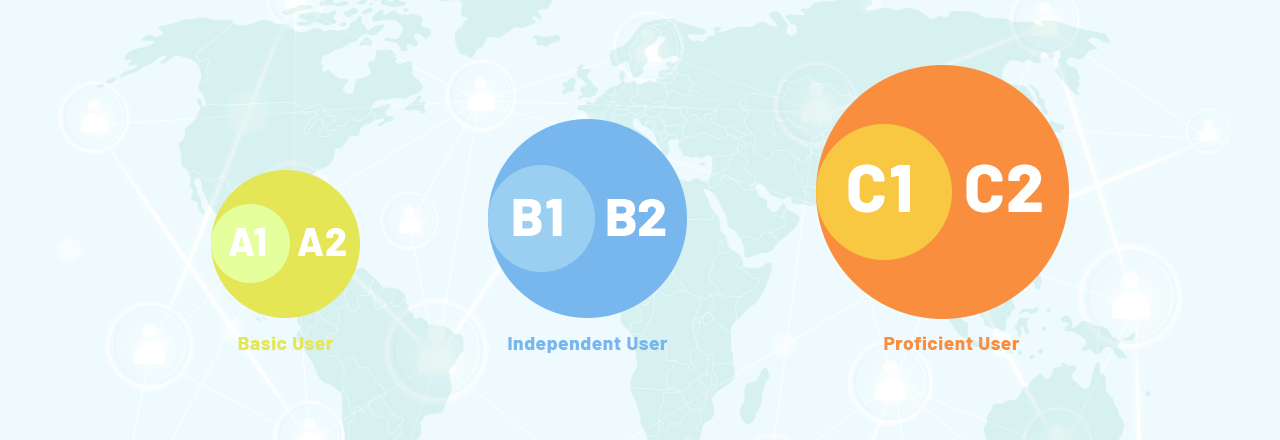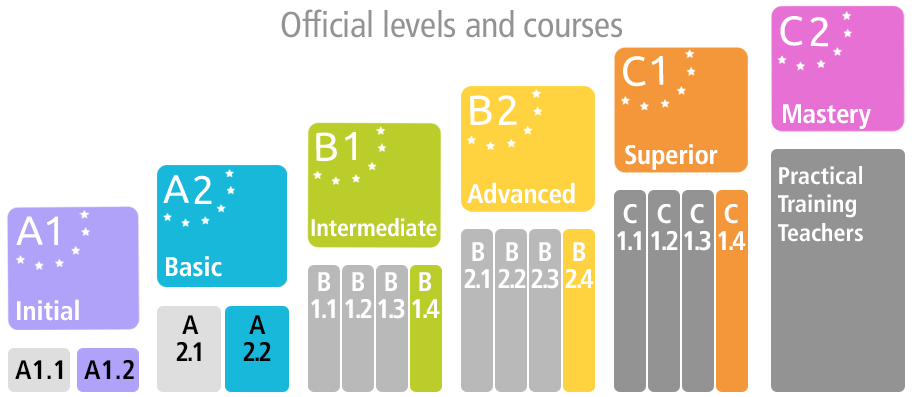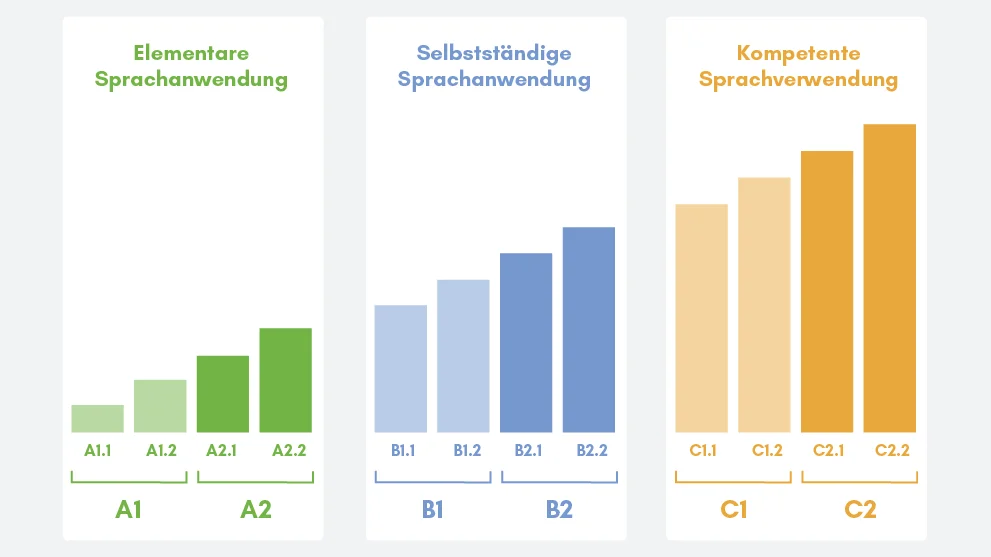
Learning German
Moving to a foreign country means facing a number of challenges, such as mastering a new language and getting used to customs different to one’s own culture. Learning German ensures your successful integration: secure a job in Germany, explore your city, make new friends. First things first, though: find more information on where to learn German below.
Anyone who wishes to live in Germany should take part in an integration course. In certain cases a permit, the certificate of eligibility, is required. You can obtain this from the Federal Office for Migration and Refugees – Integration Courses.
The integration course consists of a language and an orientation course. In order to come to terms with everyday life you first of all learn the language. The composing of letters and completing of forms are also practised. The orientation course follows on from that. This is where you learn everything connected with your rights and duties and community life in Germany. The general integration course lasts 660 hours.
Good to know: you can be exempt from the costs connected with this. To this end you must file a written application to your contact person in the Federal Office for Migrants and Refugees. You may find the organisers of integration courses in your neighbourhood with our search for intergation courses (available in German). Or you may obtain their addresses from the Foreign Nationals Authority or a migrants’ advice centre.
Various providers offer online language courses while the exact contents may differ from one provider to another. It is important, however, to select a course that matches your current level of German. Your course’s duration willdepend on yourprior knowledge. You may check your level of German in advance, before enrolling in a course. Please feel free to contact us on this issue.
Good to know:please inform yourself in advance if costs willincur for your language course – you might be eligible for exemption;therefore, you should seek advice from your contact person at the Arbeitsagentur (Employment Agency)/Job Centre beforehand. You may find suitable online language courses via our search for language courses (available in German). Another way to studyGerman is using our“Arrival-App”for free.Additionally, there are online educational programmes offered by the Government Broadcasting Station.
In the A1 German courses at Euro Generation, you will use familiar and everyday expressions and very simple sentences that aim to meet specific needs. You learn how to introduce yourself and ask other people questions about them (e.g. where they live, who they know or what they own).
LEVEL A1
In the A1 German courses at Euro Generation, you will use familiar and everyday expressions and very simple sentences that aim to meet specific needs. You learn how to introduce yourself and ask other people questions about them (e.g. where they live, who they know or what they own).

A 1 German course – A1(1)
Main topics:
- Introduce yourself/countries/occupations
- The alphabet & the numbers
- Languages and countries
- People and hobbies
- The work, the workplace
- Free time
- At the hotel
- The city map
- Food and drink/ in the restaurant
Grammar:
- Personal pronouns and verbs in the present tense
- The group of nouns: der/die/das/
- Verbs
- The negation
- Prepositions of place
- Personal pronouns in the accusative case
A 1 German course – A1(2)
Main topics:
- Daily schedule
- Stress in the office
- On the computer
- Arranging appointments
- The seasons and the weather
- Destinations, travel preparations
- Means of transport
- Living & the home furnishings
- Health
- Excuses
Grammar:
- Verbs
- Prepositions of time
- Sentence connectives: conjunctions
- The group of nouns
- Indicators of space
- Adjectives
In the A2 German courses at Euro Generation, you will understand sentences and repeated expressions related to areas of very immediate importance (e.g. information about a person and family, shopping). You can communicate in simple situations (e.g. the direct exchange of information about familiar and everyday life).
A 2 German course – A2(1)
Main topics:
- Introducing yourself
- Professions and activities
- Telling about the past
- School, training, curriculum vitae
- Daily schedule leisure activities
- Purchasing & spending money
- Words around money
- The dream of wealth: What if…?
- In the office, on the phone, making appointments
Grammar:
- Verbs
- The perfect tense
- The group of nouns
- The negation
- Main and subordinate clauses
- Verbs with dative and accusative
- Subjunctive II
- Nouns indicators of time
- Casus
A 2 German course – A2(2)
Main topics:
- Vacation
- Countries and nationalities
- Planning a trip
- Animals & dangerous animals
- People
- Living: garden, city etc.
- Healthy nutrition
- National and international news
- Theme: Environment
- Theme: Technology
Grammar:
- Indicators of space
- The group of nouns
- Adjectives
- Verbs
- The perfect tense
- Verbs + Prepositions
- Nouns
- Prepositions: of space & of time
LEVEL B
In the B1 German courses at Euro Generation, you will understand the main points of the conversation if the speaker uses a clear-cut language, concerning familiar topics such as work, school, leisure, etc. You can handle most situations, e.g. encountered when traveling within the language area. You can express yourself simply and coherently about familiar topics and personal areas of interest. You can talk about experiences and events, describe dreams and goals in life, and give brief explanations about plans and opinions.

B 1 German course – B1(1)
Main topics:
- Time and activities
- Punctuality
- Leisure time: Museums
- Leisure time: Fine arts
- Vocations
- Problems at work
- Arranging appointments
- Manners in business life
- Reading
- Past and childhood
- Media
- Advertising: Impact and history
- Advertising: Products and their properties
- The complaint
Grammar:
- The past tenses: Perfect / Preterite / Past Perfect
- Verbs + Prepositions
- Interrogative particles
- Modal verbs, brauchen + zu
- The past subjunctive (polite requests, wishes, past)
- Verbs + dative + accusative
- N – Declination
- Indicators of time
- Adverbs of time
- Reflexive verbs
- The passive
- Adjectives (comparative/superlative)
- The genitive
- Relative clauses
B 1 German course – B1(2)
Main topics:
- Language learning
- Lifelong learning
- Special learning tips
- School, certificates and grades
- Traffic problems
- Means of transport
- On the way
- Vacation: When one goes on a trip…
- Feelings of happiness
- Qualities
- Stress, anger and joy
- Food, German recipes, eating in the restaurant
- Invitations and good wishes
Grammar:
- Indicators of conditional
- Final clauses
- Nouns – Verb – Connectors
- Past tenses
- Time clauses: simultaneity, non-simultaneity
- Prepositions
- Adjectives + Prepositions
- Enumerations
Causes & consequences
In the B2 German courses at Euro Generation, you will learn to understand the basic idea of challenging texts: e.g. specialist texts from a particular field. You will…
- Be able to communicate spontaneously and without problems with native speakers of German.
- Be able to clearly formulate your own opinion and the reasons for it.
- Be able to express facts from the respective field of interest or subject without difficulty.
In a B2 German course in Berlin you will only be taught a few unknown structures with regard to German grammar, instead the grammar you have already learned at B1 level, will be intensified.
In Kapitel Zwei, the B2 level is divided into the levels B2.1 and B2.2 according to the Common European Framework of Reference for Language Learning. In the following section you will find out what we focus on.
B 2 German course – B2(1)
Main topics:
- School, Training
- Interpersonal relations
- Living and renting
- Travel, trouble on vacation & complaint letters
- Cultural differences in professional life
- Europe and the Germans
- Smalltalk
Grammar:
- Modal verbs
- Past tense of the verbs: perfect / -preteritum / past perfect
- Declination of adjectives
- Indicators of space: prepositions of two cases
- The passive
- Verbs with prepositional case
- n – Declination
- Causal and effect indicators: weil, denn, deshalb, so…dass etc.
B 2 German course – B2(2)
Main topics:
- Daily work: e-mails & telephone calls
- Activities & Leisure
- University
- History and politics
- News from all over the world
- Crime Stories
Grammar:
- The subjunctive II: politeness, unreality, the subjunctive II in the past
- Rection of verbs
- Position of words in the sentence
- Indicators of time
- Indicators of conditional
- Subjunctive I : Indirect speech
- Subjunctive I Alternate forms
- Nouns – Verb – Connections
Prepositions
LEVEL C

C 1 German course – C1(1)
Main topics:
- Weather and smalltalk
- Languages
- Luck
- Stress
- Laughing
- Success: sport and profession
- Failures
Grammar:
- Past tense of verbs
- Prepositions of space and of time
- Sentence connectives: Subordinate clauses
- Adjectives with prepositional case
- Two-part sentence connectives
- Sentence connectives: main sentences
- Modal verbs
- Subjunctive II
- Prepositions with the genitive
C 1 German course – C1(2)
Main topics:
- Progress
- Environment and climate
- The history of the division of Germany
- The Wall
- Living in Germany
- History and politics
- Music & Photography
Grammar:
- Expressing assumptions
- Relative clauses
- Extended modifiers (Partizipialattribute)
- Declination of adjectives
- Fixed connectives
- Participles and adjectives as nouns
- Subjunctive I
- Imperative
- Nominalization
- The passive and alternative forms
In the C2 German courses at Euro Generation, you will understand practically everything you read or hear without any problems. You can summarize information from different sources and present justifications and explanations uniformly. You can express yourself promptly, very fluently and precisely and be able to clarify subtle nuances within complex topics.
C 2 German course – C2(1)
Main topics:
- Communication and media
- History and memories
- Feelings, lies, strengths and weaknesses
- School time
- Career opportunities and professions
Grammar:
- Tenses of the verbs
- Verbs with prefixes, which may or may not be separable
- Subjunctive II
- Subjunctive I
- Adverbial clauses
- Verbs and their complements
- Noun connectors
- Word formation of the nouns
- Participles as adjectives
- Nominalized adjectives and participles
- Relative clauses
C 2 German course – C2(2)
Main topics:
- Technical progress
- Environment and pollution
- Medicine
- Special skills
- Feelings
- Living
- Art & Creativity
- Books and literature
- Politics
Grammar:
- Passive
- Passive replacement forms
- Modal verbs
- Declination and comparison of adjectives
- Adjectives and their complements
- Word formation of the adjectives
- Nominal style
- Prepositions of the written language
